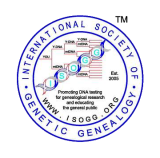Style guide to special page titles
From ISOGG Wiki
This wiki can support page titles with characters. Special attention should be given to how they are named and the creation of them. Please read the following information below before creating a page with any special characters. The most common ones an editor on the ISOGG Wiki might be interested in are:
- * (asterisk) e.g. Haplogroup R1b* should use Haplogroup R1b%2A when creating the page.
- ? (question marks) e.g. Who Do You Think You Are? should use Who Do You Think You Are%3F when creating the page.
Forbidden characters
Due to clashes with wikitext and HTML syntax, the following characters can never be used in page titles (nor are they supported by DISPLAYTITLE) magicword. They are:
# < > [ ] | { }
If the desired title of an article contains any of these characters, then an alternative title must be used instead. Often, you can simply remove the characters or spell them out (e.g. > - greater than). Note that the sharp sign ♯ (different from the keyboard # character) can be used.
Other problematic characters
Forward slashes and periods
In namespaces where the subpage feature is enabled, the forward slash (/) separates a subpage name from its main page name. However subpages are enabled in the main namespace, so article names cannot contain slashes. Please do not use them, unless you are specifically creating a subpage for an existing page.
Spaces and underscores
In links, spaces ( ) and underscores (_) are treated equivalently. Underscores are used in URLs, spaces in displayed titles. Leading and trailing spaces/underscores are stripped, consecutive spaces/underscores are reduced to a single one, and page names consisting of only spaces/underscores are not allowed at all.
Titles affected by this behaviour (except for the last restriction) can generally be made to display correctly using the DISPLAYTITLE magic word.
Colons
In general, article titles containing colons are fine, subject to the following exceptions:
- Page names cannot begin with a colon. However, if the initial colon can be dropped to produce a satisfactory title, then this should be done, and the problem fixed with DISPLAYTITLE.
- Article titles should not begin with a standard namespace prefix (Talk:, Help: etc.), as this will place them in the wrong namespace, which (among other problems) could exclude them from standard search results. In this case, another title must be found (it won't help to change the capitalization of the prefix or put spaces before or after the colon).
- Article titles cannot begin with an interwiki or interlanguage prefix, or namespace alias. Again, these are case-insensitive, and putting spaces before or after the colon will not help.
Percent and encoded characters
A title can normally contain the character %. However it cannot contain % followed by two hexadecimal digits (which would cause it to be converted to a single character, by percent-encoding). Similarly a title cannot contain HTML character entities such as / and –, even if the character they represent is allowed. In the unlikely event of such sequences appearing in a desired title, an alternative title must be constructed (for example by inserting a space after the %, or omitting a semicolon).
Question marks and plus signs
There is no reason why titles should not include ? or +. However, with such titles, attention is required when typing URLs into the address bar of a browser. Here ? is interpreted as beginning a query string, and a + in a query string is interpreted as a space. When typing in URLs, ? and + should be replaced by their corresponding escape codes, %3F and %2B. (The same technique is necessary for many other special characters, depending on browser.)
Three continuous tildes
Titles cannot contain 3 or more continuous tildes (~~~), as strings of tildes are used to create editors' signatures on talk pages.

